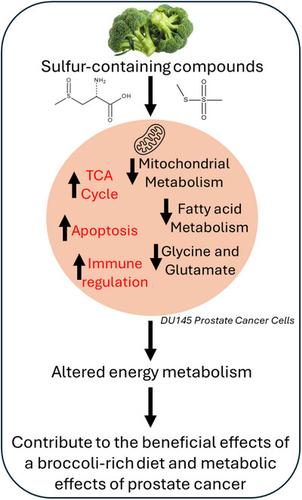S-Methyl Methanethiosulfonate, the Main Human Metabolite of S-Methyl-L-Cysteine Sulfoxide, Alters Energy Metabolism in Prostate Cancer Cells
IF 4.5
2区 农林科学
Q1 FOOD SCIENCE & TECHNOLOGY
引用次数: 0
Abstract
Cruciferous and allium vegetables contain the sulfur compound S-methyl-L-cysteine-sulfoxide (SMCSO). Considering SMCSO is found at a higher abundance compared to the glucosinolates, there are limited reports on its effect on health, with the majority of the evidence on the beneficial effects on glucose metabolism in rodent models. In the current study, we investigated the metabolic effects of SMCSO and its metabolite, S-methyl methanethiosulfonate (MMTSO), on prostate cancer metabolism. DU145 prostate cancer cells were cultured in 5.5 mM (basal), 10 mM (intermediate) and 25 mM (high) glucose concentrations in the presence of SMCSO or MMTSO (100 µM). Using Seahorse technology, MMTSO but not SMCSO reduced mitochondrial metabolism, mitochondrial ATP, and the percentage of oxidative phosphorylation and increased the fatty acid dependency of DU145 cells. Transcriptomic and metabolomic analyses observed cellular and energy metabolism pathways and immune response changes.

求助全文
约1分钟内获得全文
求助全文
来源期刊

Molecular Nutrition & Food Research
工程技术-食品科技
CiteScore
8.70
自引率
1.90%
发文量
250
审稿时长
1.7 months
期刊介绍:
Molecular Nutrition & Food Research is a primary research journal devoted to health, safety and all aspects of molecular nutrition such as nutritional biochemistry, nutrigenomics and metabolomics aiming to link the information arising from related disciplines:
Bioactivity: Nutritional and medical effects of food constituents including bioavailability and kinetics.
Immunology: Understanding the interactions of food and the immune system.
Microbiology: Food spoilage, food pathogens, chemical and physical approaches of fermented foods and novel microbial processes.
Chemistry: Isolation and analysis of bioactive food ingredients while considering environmental aspects.
 求助内容:
求助内容: 应助结果提醒方式:
应助结果提醒方式:


